Launching the #CPUOverload Project: Testing Every x86 Desktop Processor since 2010
by Dr. Ian Cutress on July 20, 2020 1:30 PM ESTGaming Tests: Red Dead Redemption 2
It’s great to have another Rockstar benchmark in the mix, and the launch of Red Dead Redemption 2 (RDR2) on the PC gives us a chance to do that. Building on the success of the original RDR, the second incarnation came to Steam in December 2019 having been released on consoles first. The PC version takes the open-world cowboy genre into the start of the modern age, with a wide array of impressive graphics and features that are eerily close to reality.
For RDR2, Rockstar kept the same benchmark philosophy as with Grand Theft Auto V, with the benchmark consisting of several cut scenes with different weather and lighting effects, with a final scene focusing on an on-rails environment, only this time with mugging a shop leading to a shootout on horseback before riding over a bridge into the great unknown. Luckily most of the command line options from GTA V are present here, and the game also supports resolution scaling. We have the following tests:
- 384p Minimum
- 1440p Minimum
- 8K Minimum
- 1080p Max
For that 8K setting, I originally thought I had the settings file at 4K and 1.0x scaling, but it was actually set at 2.0x giving that 8K. For the sake of it, I decided to keep the 8K settings.
For automation, despite RDR2 taking a lot of inspiration from GTA V in its command line options and benchmark, the only feature it didn’t take was the actual flag that runs the benchmark. As a result, we have to use key presses on loading into the game in order to run the benchmark and get the data. It’s also worth noting that the benchmark results file is only dumped after the game has quit, which can cause issues in scripting when dealing with pauses (slow CPUs take a long time to load the test). The settings file accepts our pre-prepared versions along with the command line for ignoring new hardware, and the output files when you get them have all the frame times as required.
| AnandTech | IGP | Low | Medium | High |
| Average FPS | 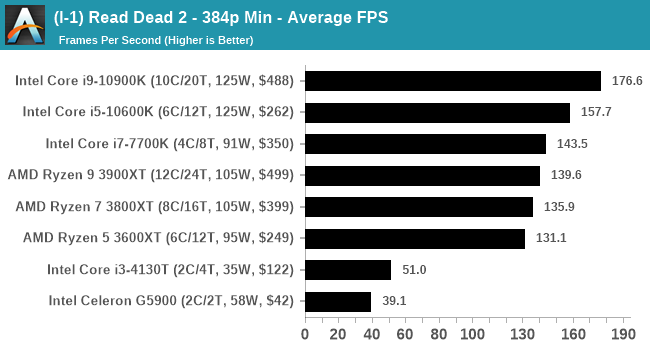 |
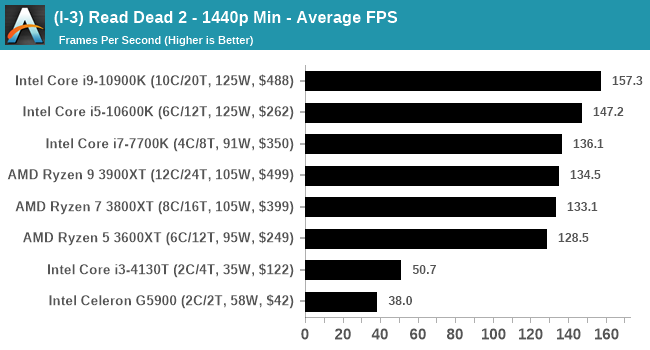 |
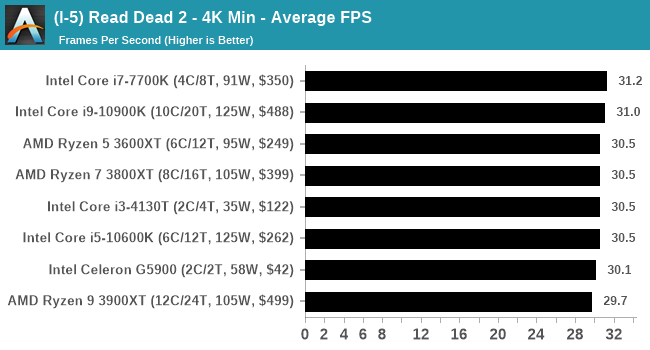 |
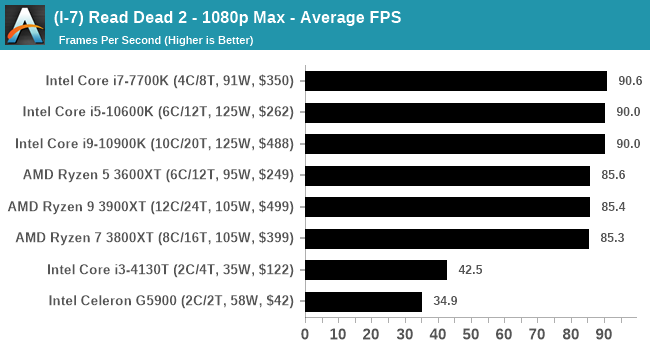 |
| 95th Percentile | 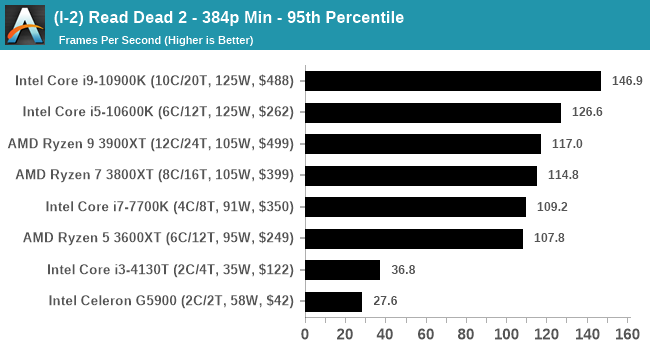 |
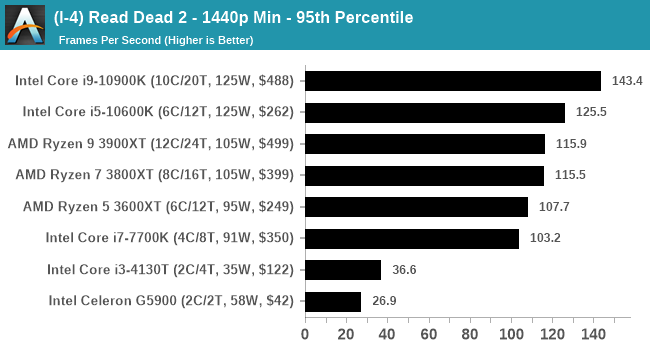 |
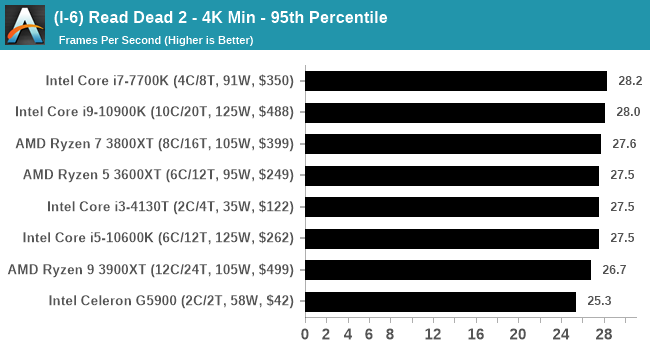 |
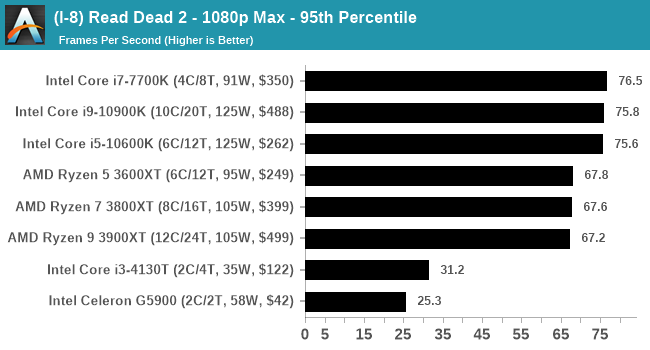 |
All of our benchmark results can also be found in our benchmark engine, Bench.


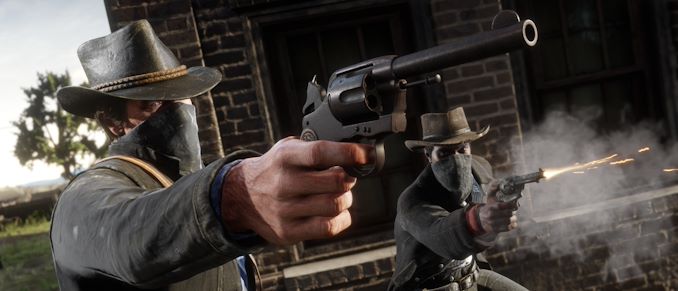









110 Comments
View All Comments
jebo - Wednesday, July 22, 2020 - link
Can we get a rundown of the underlying systems being used? RAM etc.Thanks for this!
GeoffreyA - Wednesday, July 22, 2020 - link
Astounding work, Ian! All the best on the project.Kdam - Wednesday, July 22, 2020 - link
Thanks for the effort. I was wondering if it was possible to include a cam benchmark (mastercam or other)nathanddrews - Thursday, July 23, 2020 - link
Would it be possible to add a sort or filter to see 95th percentile frame rates only? A filter by quality level? It would make reading the data much easier. QOLOldTech920 - Thursday, July 23, 2020 - link
Your CPU table (on page 2) is weirdly incomplete for Nehalem and Westmere CPUs. Specifically, it's missing the whole 1st generation Nehalem HEDT parts (aka "Bloomfield" 45 nm chips using the X58 chipset), such as i7-920, i7-940, through i7-975 EE . Combined with a recent GPU, these are still amazingly viable 4-core/8-thread CPUs.Robberbaron12 - Monday, July 27, 2020 - link
THere is no support for X58 and skt 1366 anymore in the latest version of Win 10, so its not possible to install the test suite. I know it still works if you had a 3-4 year old version on Win 10 but you can to clean install now, and I'm pretty sure skt 1156 is going the same way.Oxford Guy - Tuesday, July 28, 2020 - link
Windows 10 is a disgrace.juraj2 - Friday, July 24, 2020 - link
That is a great project. I would like to see as performance per watt has been changing during the years. Also, current benchmarks show for example CPU with 105W, but that is completely false because during the test CPU was consuming much more power. This makes results confusing and mostly in favour of Intel. Intel is cheating a lot in this regard.Oxford Guy - Tuesday, July 28, 2020 - link
Real power consumption is definitely more interesting than the "let's pretend" TDP numbers.alpha754293 - Monday, July 27, 2020 - link
This is fantastic!!!I was the person who asked for the OpenSSL benchmark because I was moving a lot of data around and needed SHA256 to ensure the data transfers completed successfully.
Thank you for putting this together.